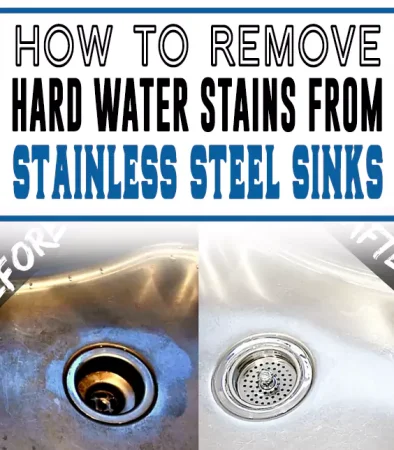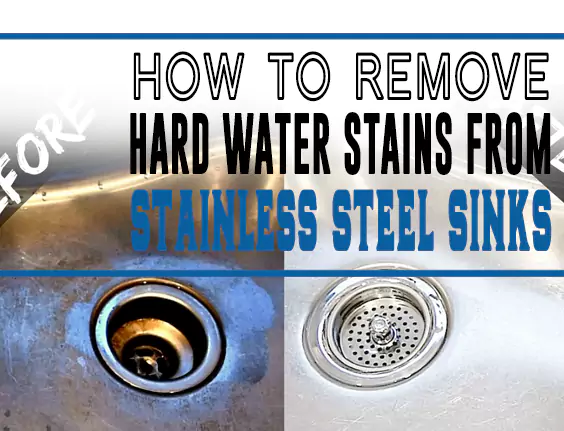If you’re experiencing hard water problem in the kitchen, it is essential to clean the stainless steel sink hard water stains. Here are some handy tips.
Stainless steel sinks are known for their durability and glowing appearance. However, as with other household equipment, they are prone to retaining stains.
While you can get into the DIY spirit to wash debris and dirt away from stainless steel sinks, getting hard water stains off can be a little challenging. They stick so hard that you might be tempted to rub rigorously only to leave scratches on the sink surface.
To stay away from the problem, you can use a kitchen sink that is hard water resistant. Here’s my detailed guide to choosing the best kitchen sinks for hard water.
In this article, I will share DIY-friendly methods for removing hard water stains from the stainless steel kitchen sink.

How to Clean Stainless Steel Sink Hard Water Stains
Cleaning hard water stains is simple and can be done with not-so-scarce products you already have around the house.
There’s typically no need to use harsh chemicals or abrasive tools. Below are three ways to remove water spots from stainless steel sinks.
Using Toothpaste and Fluoride
There are different types of toothpaste with varying percentages of fluoride in them. There are several options you can pick from that will give the desired result.
However, for tough stains, it is best to add a cream with tartar and hydrogen peroxide.
Materials Required
Here are the materials required;
- Toothpaste (with a reasonable content of fluoride)
- Cream (any product containing tartar)
- Hydrogen Peroxide
- Soft old cloth (wool or a microfiber cloth are excellent alternatives)
Now that we’ve identified the materials needed, below are the steps to follow.
Step 1: Mix Toothpaste, Cream, and Hydrogen Peroxide
Mix toothpaste and cream containing tartar in a spray bottle and dilute with hydrogen peroxide.
Step 2: Dampen a Clean Cloth
Step 3: Apply the Mixture To the Wet Cloth
After preparing the mixture, dip a clean cloth in water and squeeze out the water. Alternatively, you may use a non-abrasive sponge.
Now, you’ve got all that is required to clean hard water stains from your sink. Carefully spray the mixture in the spray bottle on the damp cloth or non-abrasive sponge.
Step 4: Scrub the Sink
Leave the wet cloth to absorb the sprayed solution properly and gently use it to scrub the stainless steel sink. Hard scrubbing may leave scratches on your stainless steel sink.
Hopefully, you’ll discover the stainless steel sink is free from hard water stains.
Using Vinegar
Vinegar is another DIY-friendly item you can use to clean hard water stains.
Materials Required
- Vinegar
- Spray bottle
- Non-abrasive sponge
- Soft cloth
Step 1: Add Vinegar to Clean Water
Make a mixture of vinegar and water in a small container. Afterward, leave the mixture for a few hours, preferably throughout the night.
Step 2: Pour the Mixture into a Spray Container
Now, carefully refill the vinegar mixture into an empty spray bottle.
Step 3: Spray the Vinegar Solution On the Sink
Before applying the vinegar mixture, extensively rinse your stainless steel sink with clean water. After rinsing, now spray the refilled vinegar solution on your sink. Before proceeding to the next step, leave the solution on the sink for at least ten minutes.
Step 4: Scrub the Sink With a Non-abrasive Sponge
A non-abrasive sponge is purpose-made to remove hard stains including chemical stains. When used with vinegar, it can also remove hard water stains. So, gently scrub the stained area with a non-abrasive sponge.
Avoid scrubbing hard with the non-abrasive sponge. Otherwise, you may leave scratches on the stainless steel sink.
Now, you’ll see the stainless steel sink is free from hard water stains.
Using Dish Soap and Baking Soda
Dish soap and baking soda are readily available homemade materials with which you can clean hard water stains on stainless steel.
Materials Required
Here are the item required for this method;
- Dish soap
- Baking soda
- Non-abrasive sponge
- Microfiber cloth/paper towel
Step 1: Make a Paste With Dish Soap and Baking Soda
Make a paste with dish soap and baking soda in a clean container. Ensure you stir the mixture thoroughly with a small spoon.
Step 2: Apply the Paste to the Sink
Use a paintbrush to apply the paste to the affected areas on the stainless steel sink. Alternatively, you can use an old toothbrush.
Step 3: Scrub the Sink
After applying the paste to the sink, scrub with a non-abrasive sponge.
Step 4: Rinse the Sink
By now, the sponge must have removed the hard water stains. Now, rinse the stainless steel sink with warm water. Finally, dry with a microfiber cloth or paper towel.
How to Prevent Water Spots on Stainless Steel Sink?
No doubt, cleaning water spots from stainless steel sinks brings back their unique glow and attractiveness.
But why go through all that pain when you can take simple preventive steps? Below are three ways you can prevent watermarks on stainless steel sinks.
1. Keep Away Wet Items and Food Particles From Your Sink
Avoid keeping a rubber mat, wet sponge/cloth, and any food particles on your stainless steel sink. Over time, these could become major culprits of discoloration for your stainless steel kitchen sink. Check, Can You Spray Paint a Stainless Steel Sink?
2. Don’t Leave Dish Soap On Your Sink
Avoid leaving dish soap on your sink. After every use, rinse away soap particles.
3. Only Rinse Your Sink With Clean Water
It is not just enough to rinse your sink after use. Ensure you use clean water. Usually, consistent use of unclean water leaves white films and watermarks on stainless steel appliances.
Do You Need to Clean Hard Water Stains from the Stainless Steel Sink?
If the water supply in your home is hard, running into hard water stains is inevitable. Because of the more than average traces of dissolved magnesium, iron, and calcium, hard water leads to rust.
As you know, rust doesn’t just make metal appliances look dull. Though you can use a kitchen sink that is hard water friendly, they eventually cause leakage (If you face the issue, Here’s my guide about caulking a stainless steel kitchen sink) and rapid aging.
Thus, it is vital to regularly rid sinks of hard water scales. Besides the use of water repellent for stainless steel sinks, also clean your sink after every usage.
It will keep it glowing and prevent any future damage. If possible, you may add a water softener to your water storage tank. In the long run, that would reduce how many hard water stains you have to deal with.
Will Baking Soda and Vinegar Remove Hard Water Stains?
Absolutely yes!! Cleaning hard water stains from stainless steel sinks can be more accessible when combining both materials. Besides, baking soda and vinegar are one of the best and most helpful home products for cleaning hard water stains.
There are several types of vinegar you can use. Generally, white vinegar and apple cider vinegar rids most stains. You will be fine if you mix both in equal measures.
However, if these two don’t yield the expected result, the cleaning vinegar has more acidic properties. It is more potent in removing hard water stains and watermarks on stainless steel.
What Causes Stainless Steel Discoloration?
Common culprits of discoloration on stainless steel are heat, harsh chemicals, and mishandling. Under excessively high temperatures, stainless steel equipment mostly develops brown build-ups.
Similarly, harsh chemicals can lead to rainbow colors on your stainless steel sink. In addition, the less chromium on your sink means high rust develops.
What is the Best Hardwater Stain Cleaner for Stainless Steel Sinks?
Vinegar is the best and most natural household product cleaner for removing hard water stains on stainless steel sinks. Following the right steps, vinegar effectively removes dirt, fingerprints, water spots, and grime. Besides the edge-cutting potency, vinegar also doubles as a sanitizer.
It is inexpensive and contains no harsh chemicals. Furthermore, it is safe around children, pets, and food. Although its smell may not be as lovely as some commercial cleaners, the scent does not stay around for long.
How Do You Make Stainless Steel Look New Again?
Below are three methods you can use to clean stainless steel materials and reverse their newness.
Method 1: Using Baking Soda
- Make a paste with baking soda and water. You can add a bit of vinegar to make it fizz.
- Spread it over the sink.
Method 2: Using Flour
- Put a tablespoon of all-purpose flour into the sink.
- Next, use a soft napkin to rub it around with some elbow grease.
- Then rinse it away
Method 3: Using Baby Oil
- Rinse your stainless steel sink
- Sprinkle baby oil on the sink
- Use a cotton or wool rag to wipe hard water stains off stainless steel. It will shine more than when you first got it.
Wrap Up Of The Options
Removing hard water stains from stainless steel sinks is not much of a difficult task. Cleaning hard water stains and build-up ensure you clean your sink after each use. Frequent cleaning can help you retain your stainless steel sink’s durability and beauty.

